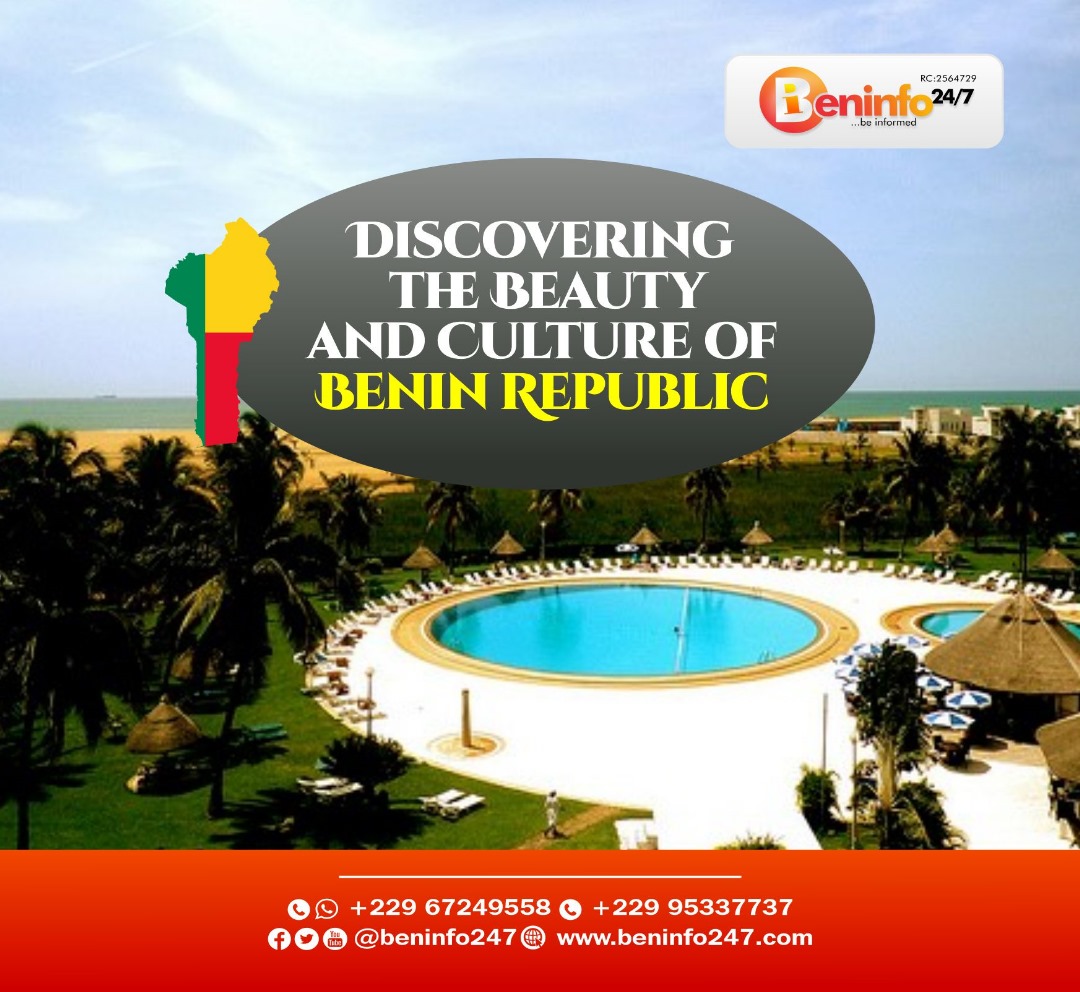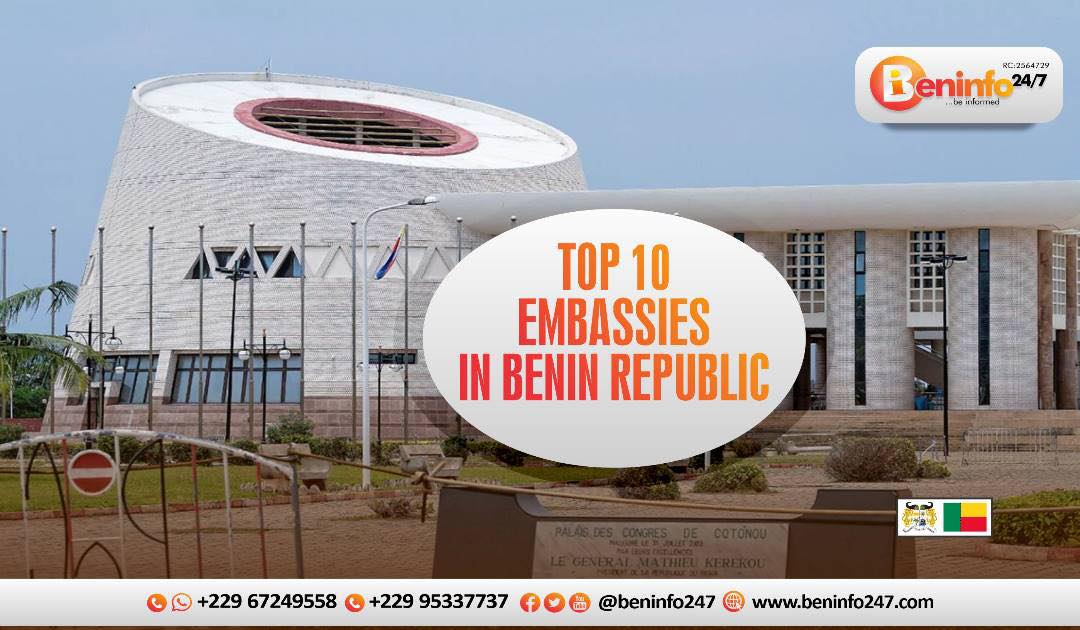Introduction: Discovering the Wonders of Benin Republic
Imagine traveling to a fascinating place in West Africa called Benin Republic. It’s a bit like finding a hidden treasure chest of culture and history. This country is bordered by Togo, Nigeria, Burkina Faso, and Niger, and it hugs the coast of the Gulf of Guinea down south.
But what’s really special about Benin is its rich mix of ancient stories, different ways of life, and the delicious food you’ll taste. It’s a place where old traditions mix with newer ones, and where lots of different groups of people come together, like the Fon, Adja, Yoruba, and Bariba.
So, join us on this adventure as we uncover the secrets of the Benin Republic. We’ll explore its history, try its tasty dishes, and get to know what makes this place so unique.
Absolutely, let’s talk about the geography and climate of Benin Republic in simple terms:
—https://www.beninfo247.com/exploring-the-beauty-of-africas-wildlife-and-natural-wonders/
Geography and Climate of Benin Republic: A Land of Many Faces
Benin Republic is like a patchwork quilt when it comes to its land. Up north, you’ll find wide, flat plains that stretch out as far as your eyes can see. It’s like the world’s biggest pancake griddle!
But as you head south, things change. You’ll discover a green paradise with forests, rivers, and hills. It’s like stepping into a lush garden.
And speaking of gardens, Benin’s coastline along the Gulf of Guinea is only about 75 miles long, but it’s packed with beauty. Imagine beaches where the sand is as white as snow.
Now, let’s talk about the weather. Benin’s climate is a bit like Goldilocks – not too hot and not too cold. Down in the south, it’s humid and warm, perfect for lush green forests. But as you go north, it gets drier and a bit hotter, like standing in a big oven.
So, whether you like the cool breeze by the coast or the warm embrace of the plains, Benin’s got a place for you!
In Benin, people come together from different backgrounds, each with their own unique traditions and ways of life. It’s like a colorful tapestry woven with various threads of culture. This diversity is what makes Benin so special.
LANGUAGE
In the Benin Republic, just like in a big family, people speak different languages and have various beliefs. They talk in languages like French, Fon, and Yoruba, depending on where they are from. When it comes to religion, it’s like a buffet with different choices. Some follow their own traditional beliefs, while others are Christians or Muslims. It’s a mix of languages and faiths that make Benin’s cultural recipe so rich and flavorful.
HISTORICAL BACKGROUND
Sure, let’s take a quick journey through Benin Republic’s history. Imagine you have a time machine, and you’re setting the dial to the past.
In the olden days, Benin was home to powerful kingdoms, like Dahomey. These kingdoms ruled the land for centuries, building impressive palaces and trading with the Europeans. Eventually, French colonists arrived, and by the early 20th century, Benin became part of French West Africa.
Fast forward to 1960, and Benin gained its independence from France. It was like a bird leaving its nest to soar on its own. Since then, the country has experienced different forms of government, from military rule to democracy.
So, think of Benin’s history as a thrilling story of kingdoms, colonization, and independence, all woven into the vibrant tapestry of this West African nation.
UNIQUE ATTRACTION
Sure, let’s talk about some cool places you can visit in Benin.
First, imagine walking through ancient palaces where powerful kings once lived. These are the Royal Palaces of Abomey, and they’re so special that the United Nations calls them a World Heritage Site. It’s like stepping back in time!
Next, picture a place called the “Door of No Return.” It’s in Ouidah, and it’s where people were taken from Africa as slaves many years ago. It’s a powerful and emotional spot that reminds us of history.
For all you nature lovers, there’s Pendjari National Park. Think of it as a big playground for animals like elephants and lions. You can go on safaris and see these incredible creatures up close.
So, whether you’re into history, culture, or wildlife, Benin has something unique to offer that will leave you with unforgettable memories.
CUISINE AND FOOD
Alright, let’s talk about the delicious food you can find in Benin.
First up, there’s something called “fufu.” It’s a soft, doughy ball made from cassava or yam, and you eat it with tasty soups or stews. Imagine it like a fluffy, edible spoon!
Then, there’s “jollof rice.” Think of it as rice cooked with a flavorful tomato sauce, and sometimes, you’ll find it mixed with veggies or even chicken. It’s like a party in your mouth!
And don’t forget “akpan.” It’s like a pancake, but even better. It’s made from corn or maize, and you can enjoy it for breakfast or as a snack. It’s like a warm, comforting hug in food form!
But here’s the real adventure – street food stalls. These are where you discover Benin’s true flavors. You’ll find all sorts of treats like grilled meat, spicy chili cakes called “gâteau piment,” and flatbreads known as “roti chaud.” It’s like a food carnival on the streets!
So, whether you’re a foodie or just looking for some tasty bites, Benin’s cuisine will definitely satisfy your taste buds with its diverse and mouthwatering dishes.
BENIN REPUBLIC TRAVEL TIPS
Sure, let’s talk about some useful travel tips for your Benin adventure.
- Visas: Before you pack your bags, make sure to check if you need a visa to enter Benin. Depending on your nationality, the requirements can vary, so it’s smart to plan this in advance.
- Local Currency: The official currency in Benin is the West African CFA franc. You’ll need it for most transactions, so it’s a good idea to have some cash on hand. You can exchange your money at banks or exchange offices.
- Health Precautions: Staying healthy is crucial during your trip. Make sure you’re up to date on routine vaccines and consider additional vaccinations for diseases like yellow fever. It’s also wise to bring mosquito repellent, especially if you plan to explore rural areas.
- Safety: Benin is generally safe for tourists, but it’s essential to take precautions as you would in any other place. Keep an eye on your belongings, avoid walking alone in dimly lit areas at night, and be aware of your surroundings.
- Local Customs: Embrace the local culture by being respectful. Dress modestly, especially when visiting religious sites, and ask for permission before taking photos of people. It’s a sign of courtesy that goes a long way.
- Transport: Benin has a variety of transportation options, including taxis, buses, and motorcycle taxis called “zémidjans.” Negotiate taxi fares in advance, and always wear a helmet when using a zémidjan.
- Language: While French is the official language, many locals speak indigenous languages like Fon and Yoruba. Learning a few basic French phrases can be very helpful.
- Local Cuisine: Don’t miss the opportunity to savor the delicious local dishes we talked about earlier. But also, be cautious about street food cleanliness. Go for stalls with many customers; it’s usually a good sign of hygiene.
- Weather: Benin has a tropical climate with a rainy season from April to July and a dry season from November to February. Plan your trip accordingly, depending on your preference for weather.
- Respect: Finally, remember that you’re a guest in this beautiful country. Show respect for the people, their customs, and their environment. It’ll make your trip more enjoyable and meaningful.
So, with these tips in mind, you’re all set for a fantastic journey through the vibrant and welcoming land of Benin!
Is the Benin Republic Poor or Rich? Unveiling the Real Story
Benin Republic, a picturesque country nestled in West Africa, often raises the question: Is it a land of poverty or prosperity? Let’s explore the economic landscape, cultural richness, and potential that define this nation.
The Economic Reality:
Benin Republic, like many nations in Africa, faces economic challenges. It’s classified as a low-income country by the World Bank, with the majority of its population engaged in agriculture. Limited access to education and healthcare contributes to these economic disparities.
Agriculture: Benin relies heavily on agriculture, with crops like cotton, corn, and cassava being major contributors to the economy. This sector provides employment for a significant portion of the population.
Trade and Commerce: Benin’s geographical location along the Gulf of Guinea has made it a hub for trade. The bustling city of Cotonou is a key center for commerce, with goods flowing in and out of the country. The informal sector plays a substantial role in this trade activity.
Challenges: High unemployment rates, income inequality, and limited access to basic services are ongoing challenges. However, it’s crucial to note that these challenges don’t define the entirety of Benin’s story.
The Cultural Wealth:
Beyond economic factors, Benin Republic boasts an abundance of cultural riches. Its history is deeply intertwined with the powerful Dahomey Kingdom, known for its magnificent palaces and vibrant traditions.
Voodoo Tradition: Benin is the birthplace of Voodoo, a religion that has influenced cultures worldwide. It plays a significant role in the lives of many Beninese people, and annual Voodoo festivals are celebrated with enthusiasm
UNESCO Heritage Sites: The Royal Palaces of Abomey, a UNESCO World Heritage Site, showcase the grandeur of Benin’s historical past. They stand as a testament to the kingdom’s rich heritage.
Hospitality: Beninese people are known for their warmth and hospitality. Visitors often find themselves welcomed with open arms, making their stay a memorable experience.
The Potential:
While economic challenges exist, Benin is taking steps toward growth and development. Initiatives to improve education and healthcare, attract foreign investment, and enhance infrastructure are underway.
So, is the Benin Republic poor or rich? The answer lies in its duality. While it faces economic hurdles, its cultural richness, vibrant traditions, and the resilience of its people paint a more complete picture. Benin is not just a nation striving for economic growth; it’s a land of potential, culture, and immense possibilities.
In exploring Benin, one discovers not only its economic challenges but also the richness of its heritage and the potential for a brighter future. It’s a place where history and hope coexist, inviting visitors to experience its unique tapestry of life.
Is the Benin Republic Richer Than Nigeria? Exploring the Economic Realities
When it comes to comparing the economic statuses of countries, it’s essential to delve beyond surface-level assessments. While Benin Republic may not have the same global economic stature as its neighbor, Nigeria, the story of their relative wealth is more nuanced.
The Currency Conundrum:
One of the factors that occasionally sparks curiosity is the exchange rate between the currencies of Benin and Nigeria. As of April 2023, the West African CFA Franc (XOF), which is the currency used in Benin, is often considered stronger than the Nigerian Naira (NGN). This might lead some to wonder if Benin is indeed richer.
The Reality of Exchange Rates:
While exchange rates can offer insights into the relative value of currencies, they don’t necessarily reflect the overall wealth or economic health of a nation. Exchange rates fluctuate for various reasons, including trade balances, inflation rates, and government policies.
Nigeria’s Economic Powerhouse:
Nigeria, with its vast oil reserves, is often seen as an economic powerhouse in Africa. Its oil exports significantly contribute to its GDP and government revenue. However, Nigeria also faces economic challenges, such as income inequality and unemployment.
Benin’s Economic Landscape:
Benin, on the other hand, has a more diversified economy, with agriculture, trade, and services playing crucial roles. While it may not have the same natural resource wealth as Nigeria, it has a stable economic foundation.
The Nuances of Wealth:
Wealth and prosperity aren’t solely defined by exchange rates or GDP figures. Factors like income distribution, access to education and healthcare, and overall quality of life also contribute to a nation’s wealth.
Conclusion:
So, is the Benin Republic richer than Nigeria based on exchange rates? Not necessarily. While the XOF may be stronger than the NGN at times, it’s crucial to consider the broader economic context.
Both countries have their unique challenges and strengths. Benin’s relative stability and diversified economy contrast with Nigeria’s oil-dependent but resource-rich status. Wealth is multidimensional, and true prosperity extends beyond the value of a currency.
In the end, it’s not a matter of one country being definitively richer than the other; rather, it’s about recognizing the complexities of economic realities and the diverse paths to prosperity in this region of West Africa.





 Protected by Patchstack
Protected by Patchstack